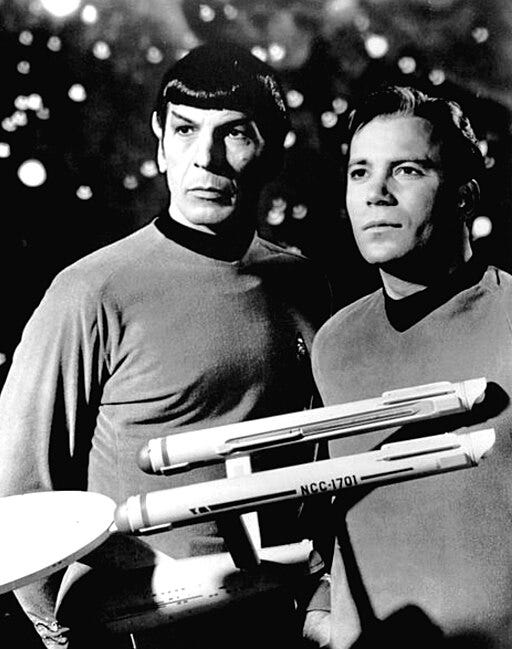Spensoir!
A comment on your last post from a subscriber with the melodious name of Zzzmdf begins with the words, “Much of life’s wisdom can be found in the original Star Trek.” I am not joking when I say that almost the exact same words went through my own mind.
I was thinking about the relationship between the Starship Enterprise’s Captain James Kirk and his First Mate, the thoroughly logical and totally unemotional Mr. Spock. I remember during the Barack Obama administration, one of Obama’s many fawning acolytes (who called themselves journalists for some reason), compared the president to Spock. The conservative commentator Bill Whittle — an ardent Star Trek fan — reacted by pointing out that there’s a reason that Spock is second in command. Kirk’s heart and passionate commitment to the good fit him for leadership. The robotic logic of Spock makes him only a helpful sidekick.
British philosopher Iain McGilchrist anatomizes this relationship in his work. He argues that the right hemisphere of the brain has a more Kirk-like holistic outlook, while the left has a more limited Spockian analytical approach. McGilchrist calls the right brain the master, and the left the emissary, and feels that, like the fawning reporter with Obama, we have confused which it is that ought to be in charge.
In his massive completist masterwork The Matter with Things, McGilchrist writes that, for the left hemisphere, “Theory trumps life. If it therefore decrees that a state of affairs shall be a certain way, then reality will, it believes, bend to the decree. Since the left hemisphere uses language to label, this often involves a belief that changing the label will change the reality.”
Now a politically conservative type like myself is quick to recognize in this description not just left brain mastery but leftist lunacy, the thinking that decrees that men can transform into women and that calling a him a her will make that transformation real. But I also can’t help noticing this syndrome in conservatives, who celebrate the very real triumphs of capitalism, say, without acknowledging its equally real spiritual costs.
More and more, I feel that so many of the answers to these problems are in the Bible, if we can only read it without piety and religious rule-making and listen to what it actually says. You mention the “uncanny precision” of the psalm which declares that those who make and worship idols become like them. It is equally uncanny and equally precise that the ultimate response to this is not found in a set of rules, but in a relationship with a God who impossibly becomes a man through a man who is, impossibly, God.
To put it in Blakean terms, eternity can only be known through the “productions of time” and the infinite must be found in “minute particulars.” I suspect this is why so many of our social ills can only be solved in the hearts of individuals.
Love, Dad





When Bonhoeffer analysed the Sermon on the Mount, he indicated that what could seem inconsistent - the ideas of being salt and light and the idea that our righteous acts should largely be hidden - is really very consistent. He says we as individuals can never know our own righteousness, lest we become enthralled with it and it becomes a massive missing of the mark. We must only know Christ, him crucified, and use all our power to follow the example he set. It's relational. It's immediate and present in every moment. It's not tied to big sets of rules. It's the complete opposite of idolatry. It's loving the fully God and fully man, Jesus, more than the cold logic and easiness of ideologies. Thank you for an excellent reminder of this fact!
Causing me to muse upon Greeks, Hebrews, and Christians. Thinking that in Greek thought, although Zeus was "king" of the many gods, it was the Titan-god Prometheus, who was not an Olympus inhabitant, who created the human. What does that imply about the relative position of king-god and human? Moving on to the Hebrews: they perceived God as creator of universe and men, as judge, but very distant. He did not even provide them with His own name until Moses was sent to "do diplomacy" with Pharaoh. Enter upon the stage, Jesus of Nazareth, who speaks over and over again, of God as not only creator of men, of the universe, but as Daddy, who reaches out to embrace each of His children. See what love the Father has given us, that we should be called the children of God. And so we are.